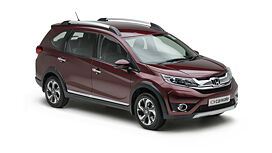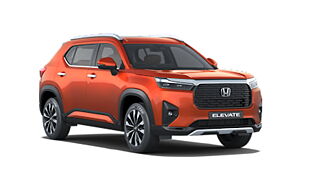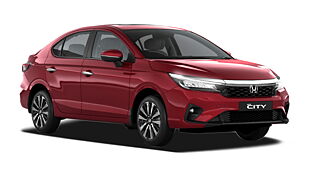Introduction

For a person looking to buy a petrol automatic it is safe to assume, he won’t be travelling long distances on a daily basis. It would also be safe to assume that an automatic petrol car won’t have a chauffeur and will be owner-driven most of the time. Throw in the desirability and practicality a compact SUV offers over a sedan and you have the two cars here – that fit all the mentioned criteria perfectly.
The newest kid in the compact SUV segment is the Honda BR-V. It is easily the most practical SUV here and has all the equipment you want and not much extra. Unlike the Creta, the BR-V uses a CVT transmission which promises better fuel efficiency, which is an important criteria considering they use expensive petrol fuel.
Ever since its launch in 2015, the Hyundai Creta has pretty much been the default choice in its segment. Its combination of proper SUV stance, quality cabin, spacious insides, potent motors, sorted dynamics and long list of standard features have made it hard to beat.
So has the BR-V got what it takes to topple the current numero uno? Let the games begin.
Visual Appeal

You won’t need a keen eye to spot that it’s the Creta that looks more like an SUV than the BR-V. The Honda though looks handsome on its own, especially when viewed from the front. The thick chrome strip, stylish projector shod headlamps and the large bumper gives it immense presence. At the rear it looks smart, thanks to the large chrome strip and the bloated boot lid which gives it loads of visual mass. But when viewed in profile, the Mobilio MPV linage comes to the fore. It looks too similar to the Mobilio and even the flared wheel arches, large wheels and rugged cladding do little to hide the MPV silhouette.

The Creta on the other hand, has more SUVish cues and the upright stance and straight lines make it look rugged. The large chrome grille flanked by the chiselled bumper gives it a mini Santa Fe look. Even in profile, the large glasshouse, upright pillars and large wheels convince you of it being an SUV. Sure, it doesn’t have the sharp cuts and creases of the BR-V but it’s a design which appeals to a wider audience and doesn’t look overdone.

Both these SUVs are based on smaller hatchbacks. Where in the BR-V you can still recognise some styling elements from the Honda Brio, the Hyundai Creta doesn’t look anything like the i20, that it’s based on. The BR-V is understandably longer than the Creta as it gets an extra row of seating. But crucially the Creta is wider which translates into better shoulder room. On the weighing scale the Creta is slightly heavier than the BR-V but it also gets a larger and a more powerful motor. As far as suspension is concerned, there are no surprises and you get a familiar McPherson struts up front and a non-independent torsion beam at the rear setup in both these cars.
Quality vs Quantity

Just as these SUVs are very different on the outside, they are similarly different on the inside. The BR-V shares its dashboard with the Honda Amaze and has the same asymmetric design that looks interesting. It is also well though-out, with nice touches including multiple cubby-holes and loads of cupholders too. Overall quality is not too bad, but it falls quite a bit short of the Hyundai as far as fit and finish is concerned. Also, overall plastic quality, though largely good, is still a notch or two down on the standards set by Creta.

But excellent fit and finish isn’t the Creta cabin’s only strong suite. Between the two, we preferred its design too, as it looks more coherent and the two-tone treatment is smart and well thought out as well. The Creta’s cabin is quite practical too with places to store bottles, cups and knick-knacks.

Like all Honda’s, the brilliance of the BR-V lies in its space efficiency. Ingress into the spacious cabin is made easy by large doors which open wide and the ideal seat height. Visibility out is good, thanks to the generous glass area but the front quarter-windows near the slim A-pillars obstruct view. The front seats have a tall seating position and are pretty broad with generous bolstering and are comfortable over long journeys. At the rear, the seat squab is a touch short, so, under thigh support is not as good as we would have liked. Other than that, it’s hard to fault the back seat. The adjustable back rest, terrific head- and legroom plus generous width make the BR-V’s bench comfortable. The flexible manner in which the rear seats function is also outstanding.

The Creta, on the other hand, may not have the flexible seating of the Honda but on its own, it is spacious and practical too. The Creta’s rear bench is very well contoured and is easily more supportive than the BR-V’s. Sure, it doesn’t have a reclining backrest and a sliding bench, but it has ample cushioning, generous thigh support and a nicely judged backrest angle make it a relaxing place. Similarly, the front seats are very comfortable and it’s easy for most people to get into a good driving position. But the BR-V offers a third-row of seating, which the Creta can never match. Although in the back you sit quite low and thigh support is in short supply, ample kneeroom makes the BR-V a genuine seven-seater. Also the boot is much bigger on the Honda – it has a wide opening and a low loading lip too.

While the Creta in this automatic trim is only available in the lower SX Plus trim, it is quite well equipped. It gets a touchscreen system with satellite navigation, and there’s Bluetooth, USB, aux and a CD player for the audio system. There are also rear parking sensors with camera, ABS with brake assist and two airbags. The BR-V petrol auto like the Creta comes in the lower V variant. It gets essential features like two airbags, ABS, music system with USB, AUX and Bluetooth compatibility, auto climate control and Air-Con blowers for rear passengers with speed control. But it loses out on basic features like a touchscreen infotainment system, navigation and rear parking sensors with camera. You feel a bit short-changed considering the high sticker price Honda is asking for.

Dump the clutch

The Hyundai Creta, at 122bhp has 6 horses more than the BR-V. But it’s the Honda that’s the quickest to 100kph, taking 12.97sec due to it being lighter and possessing a more willing motor. Also, its CVT gearbox functions in a way that keeps the engine running where it makes the meat of its power throughout the acceleration run. The 1.5 litre i-Vtec motor feels more responsive at lower revs too and it is apt for the cut-and-thrust environment of urban traffic. The box’ keeps the engine in the 2000-2500rpm band if you only use part throttle. There’s more performance on tap if you use more throttle, but this is accompanied by a considerable increase in engine noise.

The Hyundai Creta, on the other hand, isn’t as smooth at shifting through its six gears, and power delivery is a bit abrupt initially, making it tricky to drive smoothly. It also does its best work when it’s revving near the redline, so you will occasionally wish you had more power at low speeds, for say, shooting into gaps in traffic. The throttle response is blunt and this is where the gearbox also tends to get confused and fails to make full use of the power on tap. You eventually learn to go flat on the throttle in order to get the box to downshift in the upper reaches of the powerband where this motor starts coming in on its own. But the its in the manual mode the Creta petrol feels the best This allows you to be in the right gear at the right time.
Thanks to the torque converter gearbox, at higher speeds, it is the Creta that feels the most at ease. Overtaking is easier and as the gearbox downshifts in the meat of the powerband. The BR-V makes a lot of noise getting to highway speeds, but once there, settles down to a reasonably quiet cruise.

The Hyundai is, by far, the most refined car here, and this is not only down to the sound insulation but the engine too is silky smooth and vibe-free. Where the BR-V’s motor whines when worked hard, the Creta’s motor feels composed.
Unsurprisingly the BR-V proved to be the more efficient SUV here. Thanks to the CVT gearbox and lighter kerb weight the BR-V returned a decent 9.8kmpl in the city and 14.4kmpl on the highway. The Creta managed a lower 9.1kmpl kmpl in the city and 13.8kmpl on the highway. But the larger 60 litre tank on the Creta gives it a longer range of 590 between fuel stops as compared to the 430km on the BR-V.
Handle this

Both these cars are quite closely matched as far as ride quality is concerned. Over most surface, at any speed, both these cars remains unfazed, as they simply go about their business, keeping you comfortable over the biggest of potholes. The Creta does feel slightly stiffer than the BR-V at low speeds but on the flip-side it has a flatter ride at higher speeds. The Creta’s suspension feels more refined too which is mainly down to its exceptional sound insulation. The BR-V on the other hand feels coarse as there is more road noise and it just doesn’t feel as sophisticated as the Creta.

But while the Hyundai comes out on top in terms of ride quality, the Honda gets our vote for handling. The BR-V feels more precise and predictable as it dives into corners more readily. Grip levels are good and when in the mood, this Honda is lot of fun on a twisty road. The main deterrent on the Creta is the steering, which though is well weighted, feels numb and unexciting once speed builds up. It also feels a size bigger than the BR-V as the Creta has more body roll and feels a little top-heavy. Overall handling on the Creta, is safe, but don’t expect it to thrill you like the Honda on twisty roads.

Verdict

Rank 2
Final Score: 374/600
Price: Rs 11.99 lakh Ex-showroom, Delhi)
The BR-V scores well when it comes to space, flexibility and ease of use. Also, the 1.5-litre petrol engine feels peppy and the well-tuned CVT gearbox makes it ideal for our cut-throat urban environment. The BR-V’s trump card, though, is its flexible cabin. The fact that it offers seven seats and when not in use, you can fold the third-row flat for a large luggage bay. However, when you bring the Creta into the picture, the BR-V feels a bit bland. Its interior quality is a notch or two down from the Hyundai, it looks too much like a MPV and equipment list is sparse too. Its average sound insulation marks it down further.

Rank 1
Hyundai Creta SX Plus A/T
Final Score: 380/600
Price: Rs 12.88 lakh (Ex-showroom, Delhi)
The Creta does everything the BR-V does, but in a more sophisticated and desirable manner. Sure, the BR-V is nearly a lakh cheaper than the Creta, but at the end of the day, it’s the Hyundai that comes out on top and with good reason. It feels much more premium on the inside than the Honda, seats are more comfortable, is spacious, has loads of features and its 1.6-litre petrol motor is very refined too. Sure it isn’t dynamically as accomplished as the BR-V and the gearbox could have been better, but for an average buyer, it is good enough. In the old tussle between quantity and quality, it’s the Creta that comes out on top, because it is the better all-rounder.
Pictures by: Kapil Angane
Click here for Creta petrol A/T first drive
Click here for BR-V first drive
Click here for features comparison
Specification
| CAR NAME | Hyundai Creta |
Honda BR-V |
| Variant | SX Plus A/T | V i-Vtec A/T |
| ENGINE | ||
| Fuel | Petrol | Petrol |
| Installation | Front, transverse | Front, transverse |
| Displacement | 4 cyls, 1591cc | 4 cyls, 1497cc |
| Bore/stroke | 90.0/84.0mm | 73.0/89.4mm |
| Valve gear | 4 valves per cyl DOHC | 4 valves per cyl DOHC |
| Power | 122bhp at 6400rpm | 117bhp at 6600rpm |
| Torque | 154Nm at 4850rpm | 145Nm at 4600rpm |
| Power to weight | 95.31bhp per tonne | 94.5bhp per tonne |
| Torque to weight | 120.31Nm per tonne | 117.12Nm per tonne |
| Gearbox | 6-speed automatic | Step CVT automatc |
| CHASSIS & BODY | ||
| Kerb weight | 1280kg | 1238kg |
| Tyres | 215/60 R17 | 195/60 R16 |
| Spare | Full size | Full size |
| STEERING | ||
| Type | Rack and pinion | Rack and pinion |
| Type of assist | Electric | Electric |
| Turning circle | 10.6m | 10.6m |
| BRAKES | ||
| Front | Ventilated Discs | Ventilated Discs |
| Rear | Discs | Discs |
| Anti-lock | Yes | Yes |
Test Data
| CAR NAME | Hyundai Creta | Honda BR-V |
| Variant | SX Plus A/T(Petrol) | V i-Vtec A/T |
| PERFORMANCE & BRAKING | ||
| 0-20kmph | 1.28s | 1.46s |
| 0-40kmph | 3.09s | 3.54s |
| 0-60kmph | 5.51s | 5.95s |
| 0-80kmph | 8.77s | 8.93s |
| 0-100kmph | 13.04s | 12.97s |
| 0-120kmph | 19.31s | 18.46s |
| 20-80kmph in 3rd gear | 7.38s | 8.49s |
| 40-100kmph in 4th gear | 9.93s | 10.65s |
| 80-0kmph | 27.52m | 26.54m |
| FUEL ECONOMY | ||
| City | 9.2kmpl | 9.8kmpl |
| Highway | 13.8kmpl | 14.4kmpl |
| Tank size | 60 litres | 42 litres |
| Range | 590km | 430km |
| INTERIOR MEASUREMENTS | ||
| Front | ||
| Knee room(Max/min) | 870/640mm | 820/600mm |
| Headroom(Max) | 1000mm | 1050mm |
| Shoulder room | 1400mm | 1370mm |
| Backrest height | 650mm | 600mm |
| Rear | ||
| Headroom | 980mm | 1010mm |
| 1m kneeroom | 770mm | 780mm |
| Shoulder room | 1330mm | 1320mm |
| Knee room(Max/min) | 880/640mm | 960/700mm |
| Seat length | 500mm | 480mm |
| Backrest height | 660mm | 560mm |
| Boot | 420litres(calculated) | 710litres(calculated) |
| Depth/width/height | 840/1000/500mm | 840/1250/650mm |
| Loading lip height | 710mm | 600mm |
Score sheet
| Parameters | Max points | Hyundai Creta SX Plus A/T |
Honda BR-V i-Vtec |
| DRIVING FEEL | |||
| Steering response | 20 | 13 | 14 |
| Directional stability | 25 | 16 | 15 |
| Engine characteristics | 25 | 16 | 14 |
| Gearbox | 20 | 13 | 13 |
| Visibility | 10 | 8 | 7 |
| Intermediate results | 100 | 66 | 63 |
| SPACE | |||
| Front Space | 25 | 17 | 18 |
| Rear space | 25 | 16 | 17 |
| Feeling of space | 20 | 15 | 14 |
| Boot space/flexibility | 20 | 14 | 20 |
| Payload | 10 | 7 | 7 |
| Intermediate results | 100 | 69 | 76 |
| IN THE CABIN | |||
| Comfort equipment | 25 | 13 | 11 |
| Operatibility | 15 | 12 | 11 |
| Feel of quality | 20 | 15 | 12 |
| Front seats/ingress | 20 | 17 | 15 |
| Rear seat/ingress | 20 | 15 | 14 |
| Intermediate results | 100 | 72 | 63 |
| PERFORMANCE | |||
| Acceleration | 25 | 15 | 15 |
| Top speed | 10 | 7 | 7 |
| Driveability | 30 | 21 | 19 |
| Braking | 25 | 20 | 20 |
| Environment | 10 | 4 | 5 |
| Intermediate results | 100 | 67 | 66 |
| ROAD MANNERS | |||
| Ride quality | 30 | 21 | 21 |
| Turning circle | 15 | 13 | 13 |
| Handling | 20 | 12 | 13 |
| Manoeuvrability | 15 | 11 | 12 |
| Safety | 20 | 5 | 3 |
| Intermediate results | 100 | 62 | 62 |
| PRICE | |||
| Price | 45 | 14 | 15 |
| Resale | 10 | 7 | 7 |
| Warranty | 10 | 7 | 6 |
| Fuel efficiency | 35 | 16 | 16 |
| Intermediate results | 100 | 44 | 44 |
| Total | 600 | 380 | 374 |


























